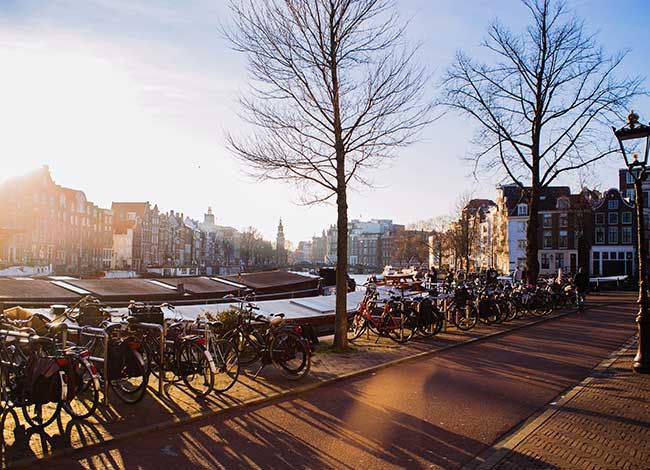Netherland
The Netherlands, a constituent country within the Kingdom of the Netherlands, operates as a parliamentary democracy under a unitary state system. Often colloquially referred to as Holland, the nation is located in Western Europe, bordered by Germany to the east, Belgium to the south, and the North Sea to the north and west.
With its central location in Europe, many European capitals are easily accessible from the Netherlands. The country boasts the ninth-highest per capita income globally and serves as the host to prominent international organizations, including the Organization for the Prohibition of Chemical Weapons and five international courts. Notably, The Hague is home to four of these courts, as well as the EU’s criminal intelligence agency Europol and judicial cooperation agency Eurojust, earning the city the moniker of “the world’s legal capital.”

In May 2011, the Netherlands was ranked as the “happiest” country according to findings released by the Organization for Economic Co-operation and Development. Today, the Netherlands is recognized as a progressive nation, particularly evident in its drug policy and legalization of euthanasia.
The Netherlands experiences a moderate maritime climate characterized by cool summers and mild winters. The duration of sunshine hours fluctuates due to the geographical latitude, resulting in shorter days in December, with barely 8 hours of daylight, and longer days in June, with nearly 17 hours of daylight.
Despite its relatively small size, the Netherlands holds significant international influence. It ranks as the 21st largest economy globally. Several major multinational corporations, including Philips, Heineken, KLM, Shell, ING Bank, and Unilever, hail from the Netherlands. Moreover, notable companies such as Sony, Sara Lee, and Microsoft have chosen the Netherlands as their European headquarters.
Studies in Netherland
The Dutch higher education system is renowned for its exceptional quality and its globally diverse study environment. It boasts the largest selection of English-taught programs on the European continent. Dutch higher education operates under a binary system, providing students with the choice between two distinct types of education.
At a research university, your emphasis will be on research-driven tasks, whether in an academic or professional context. At a university of applied sciences, you have the option to pursue a professional program in applied arts and sciences, aimed at equipping you for a particular career path. Both research universities and universities of applied sciences have the authority to grant bachelor’s or master’s degrees.
Admission Requirements
The primary criterion for admission to a bachelor’s program is a secondary school diploma meeting the institution’s specified level. Similarly, for admission to a master’s degree program, a bachelor’s degree or its equivalent is required. Proficiency in English is crucial, demonstrated through successful completion of an English language test, with commonly accepted exams being IELTS and TOEFL, although some institutions may recognize other tests.
Preparatory Year
Occasionally, you may not meet the requirements for your desired program initially, but with additional preparation, you could attain eligibility. In such cases, your chosen Dutch higher education institution may issue a conditional letter of acceptance. Dutch immigration regulations permit you to arrive in the Netherlands for up to one year before your studies commence to undertake preparatory courses and successfully complete examinations set by the institution. Upon passing these examinations, the conditional letter of acceptance will be replaced with a confirmed letter of acceptance.
Student Visa Entitlement
For students hailing from countries outside the EU/EEA or Switzerland, certain limitations apply should you wish to seek employment alongside your studies. Obtaining a permit is necessary, and you’re restricted to a maximum of 10 hours of work per week. Alternatively, during the summer months of June, July, and August, full-time employment is permitted. However, if your study program mandates an internship and you’re enrolled at a Dutch host institution, a work permit is not required.
1 year stayback
Upon completing their studies at a Dutch university, foreign students have the opportunity to remain in the Netherlands for up to one year to seek employment as highly skilled migrants. Encouraging international Bachelor’s and Master’s graduates to commence their careers in the Netherlands, the Dutch government facilitates this transition by granting a residence permit for a search year. Valid for twelve months, this permit grants unrestricted access to the Dutch labor market.
Dutch Diploma
Upon attainment of a Dutch diploma, Nuffic offers the service of providing an approximate assessment of its value. This assessment furnishes detailed information regarding your study program and offers an overview of the Dutch education system. Additionally, it compares your diploma to national equivalents, offering clarity on your degree’s standing. This comprehensive insight aids in enhancing your employability prospects outside the Netherlands, as prospective employers gain a better understanding of your qualifications. Moreover, should you choose to pursue further studies abroad, the diploma description serves as a valuable reference outlining your academic background for educational institutions.
